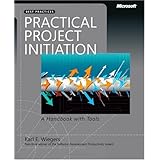
Average Reviews:

(More customer reviews)There is one word that particularly comes to mind when I think of Karl Wiegers: solid. I've been reading Mr. Wiegers articles and books about software for at least a decade, and Practical Project Initiation is as solid as I've come to expect. I use the word "solid" specifically to describe the kind of advice that Wiegers offers, which is typically based on real world experience and research, never on conjecture, received tradition, or trends. Karl is all about doing software right and helping you do the same.
There are several things I like about this book. First and foremost, I like that it is short and narrowly focused on the topic of starting new software projects--a neglected area to be sure. Much like Robert Galen's recent book Software Endgames focuses on getting a troubled project over the finish line, Practical Project Initiation focuses on the start of the process, with the idea of helping you keep your project from getting into trouble in the first place.
At 200 pages, the book is short (by software book standards anyway) not only because the focus is narrow but also because Wiegers is concise; there is almost no fluff here. I think Wiegers knows that when you need a book like this, you need immediate help getting your project off on the right foot, not three months worth of study material. I was able to read it all the way through pretty quickly, and much of the material is designed so that you can come back to it later for reference purposes.
The ironic part of what I've said about the book's narrow focus is that the first 25 pages of the book may actually be one of the best short introductions out there to the broad topic of project management.
Another thing I really like about Practical Project Initiation is that Wiegers does not steer you in the direction of a particular process, or try to propose Yet Another Great Methodology, or try to convince you of the One Right Way to develop software. (In fact, I seem to remember an essay by Wiegers from a few years ago called "No New Models!") Weigers makes room for whatever methodology/process you are using, and if you're really not sure what methodology you are using or should be using, don't worry--just follow the foundation advice in this book, and you'll be okay. Another way of saying this is that, while the book overall does have a strategic scope, the focus of the material is very tactical. The tactics Wiegers suggests can be used on the most agile Agile project or the most formal "heavyweight" project.
Before this review gets too long, I want to highlight the wealth of "tools" that come with this book. Many of these are tools in the literal sense, in the form of worksheets, checklists, and templates that are printed in the book and that can be downloaded for free. But the whole book is full of tools in the figurative sense also--things like the wideband delphi method for estimation, a feature triage process for figuring out what to include in the project when there's just too much scope, and techniques for identifying and managing risks.
If you, like me, just like to geek out on software books and pick up new techniques and insights, I recommend this book for reading and loaning out. If you are more squarely in the target audience of the book--being a person who is tasked with getting a software project off the ground--this book is a must-have. Get it fast, read it fast, and put Wiegers practical advice into action right away.
Click Here to see more reviews about: Practical Project Initiation: A Handbook with Tools (Best Practices)
Product Description:
Get the practical guide to getting your development project off to a successful start!
Zero in on key project-initiation tasks--and build a solid foundation for successful software development. In this concise guide, critically-acclaimed author Karl E. Wiegers fills a void in project management literature by focusing on the activities that are essential--but often overlooked--for launching any project. Drawing on his extensive experience, Karl shares lessons learned, proven practices, and tools for getting your project off to the right start--and steering it to ultimate success.
Lay a foundation for project success--discover how to:
* Effectively charter a project
* Define meaningful criteria for project success and product releases
* Negotiate achievable commitments for project teams and stakeholders
* Identify and document potential barriers to success--and manage project risks
* Apply the Wideband Delphi method for more accurate estimation
* Measure project performance and avoid common metrics traps
* Systematically apply lessons learned to future projects
Companion Web site includes:
* Worksheets from inside the book
* Project document templates
* Resources for project initiation and process improvement
Want to read more honest consumer review about Practical Project Initiation: A Handbook with Tools (Best Practices) now ?

0 comments:
Post a Comment